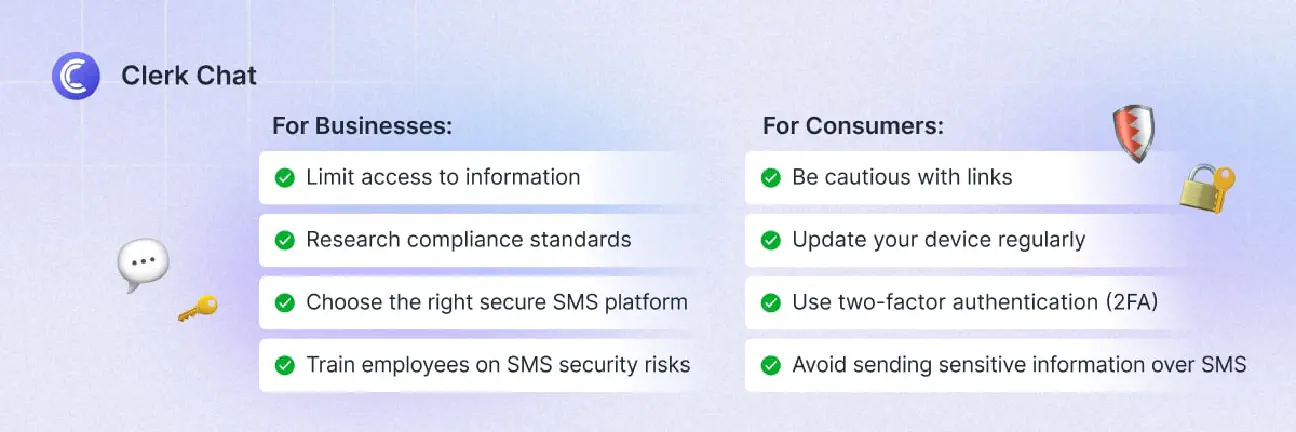Are Text Messages Secure? How to Optimize Text Message Security
By Team Clerk Chat
- Updated: October 10, 2024
SMS (text messages) are one of the fastest, most convenient, and effective ways to communicate. In fact, around 5 billion people worldwide send and receive texts every day. But have you ever stopped to wonder: “Are text messages secure?”
These days, it’s not just consumers that rely on text messaging, businesses leverage A2P texting and SMS services for everything from marketing to customer service.
If the messages you send aren’t secure, compliant, and aligned with data privacy rules, you could land yourself in hot water, facing regulatory fines, and lose consumer trust.
So, how secure are text messages exactly, and is there any way you can actually improve texting security, and reduce your exposure to risks? Here’s everything you need to know.
How Secure are Text Messages? The Basics
We know that text messages are convenient. SMS (Short Message Service) allows mobile device users around the world to send and receive messages at incredible speed.
Virtually every mobile device has built-in support for text messaging, meaning consumers and companies can easily contact people anywhere, at any time.
Plus, in the business world, SMS can be extremely useful. A mass messaging service can help you to attract traffic to your company and increase conversions.
A 2 way texting strategy can even give you a way to optimize customer service, giving your customers another efficient way to communicate with you about products or services.
On top of that, SMS benefits from instant delivery and a high engagement rate. Not only can you reach your customers instantly with time-relevant campaigns, messages and urgent notifications, but you can almost guarantee your customers will open your texts. In fact, the average open rate for text messages is around 98%.
But are text messages secure?
That’s where the problem lies. Text messages aren’t inherently secure, and embracing the wrong strategy for your messaging campaigns can lead to a range of problems.
Is Text Messaging Secure? The Core Problems
Ultimately, the answer to “are text messages secure?” is “no” – at least, most text messages aren’t inherently secure. There are a few key issues with text message security everyone should be aware of.
1. Text Messages aren’t Encrypted
Encryption is a crucial part of effective data security. Encryption basically means that the plain text or information you send in a message is scrambled at the point of transmission, and converted back into readable text at the recipient’s end, ensuring other people can’t intercept and access data.
Text messages aren’t encrypted as standard, and simply “encrypting” your SMS isn’t simple. Basic SMS technology doesn’t support advanced encryption features. Even if the infrastructure supporting SMS transmission was upgraded in the future, there’s a chance it wouldn’t be compatible with all the various platforms and devices used by the general population.
To leverage encryption, and comply with industry regulations when investing in SMS delivery, you need a dedicated platform that enables encryption.
2. Text Messages are Subject to Interception
Unfortunately, it is possible for people to intercept text messages. SMS doesn’t have entirely secure delivery mechanisms and protocols, and the fact that these messages aren’t encrypted doesn’t help.
Sometimes, if information sent via SMS falls into the wrong hands, the results can be disastrous. For instance, if a customer asks for a MFA PIN to log into a bank account, and a hacker intercepts that text, and also has access to other account details, they can potentially hack that account.
Even with strategies for text messaging security in place, there are various threats that can emerge, such as problems caused by:
- SMS Phishing: Phishing is a type of social engineering attack where hackers convince victims to give away sensitive information, sometimes by encouraging them to click on a malicious link that allows them to download malware onto a device.
- SMS Spoofing: Cybercriminals can also impersonate legitimate individuals or organizations, like a bank to extract sensitive information from customers. For instance, they might convince them to set up a shared 2FA account to help them access their credentials.
- Viruses: Some malicious texts sent by criminals can contain viruses and malicious content. This is particularly true in MMS messaging, as it’s possible to transmit various different types of files over text
3. Text Message Privacy Issues
If you’re wondering: “are text messages secure?” you might also be wondering if they’re private. Unfortunately, the answer to this is also often a “no.”
Privacy can be compromised with traditional text messaging because these messages often pass through servers before reaching their intended recipients. If these servers are breached or the messages are intercepted en route, your sensitive data could fall into the wrong hands.
Aside from the fact that other people can maliciously gain access to SMS content using phishing schemes and “man in the middle attacks,” SMS in general isn’t particularly private.
It’s easy for someone else to oversee the message on a smartphone when it’s accessed in a public place. Some smartphones even show message snippets on a home or lock screen, that can contain sensitive information.
This is a serious problem, particularly if you’re investing in HIPAA compliant texting practices, which require you to ensure personally identifiable data doesn’t fall into the wrong hands.

How to Improve Text Message Security
Clearly, there are various issues with text message security and privacy. If the answer to “are text messages secure” is a resounding “no” this means both consumers, and companies using text messaging strategies need to ensure they’re taking extra precautions to protect themselves.
Text Messaging Security Tips for Everyday Consumers
The way we communicate has evolved drastically. While messaging apps and social media have taken center stage, SMS remains a widely used means of communication. Whether it’s for receiving two-factor authentication codes or quick updates from your service providers, SMS is a trusted channel for information exchange. However, just like any other form of digital communication, SMS isn’t immune to security threats.
Here are some essential practices to help you implement secure SMS communication.
- Be cautious - Just like in email, be cautious when clicking on links or opening attachments sent via SMS. Cybercriminals can send phishing links or malicious attachments that can compromise your device and personal information. Always verify the source of the message and avoid clicking on links from unknown or suspicious senders. Even if a link appears to be from a trusted source, consider verifying its authenticity through other means before clicking on it. Make sure you stay up to date on new text scams and attacks too.
- Protect your phone with a passcode or biometric authentication - Set up a strong passcode or use fingerprint or facial recognition to lock and unlock your device. This ensures that even if your phone is lost or stolen, your SMS messages remain protected.
- Update your device regularly - Updates often contain patches for vulnerabilities that cybercriminals may use to their advantage. By keeping your device and apps up to date, you reduce the risk of being a victim of SMS-related security threats.
- Use two-factor authentication (2FA) - Enable two-factor authentication (2FA) for your accounts whenever possible, especially those that rely on SMS for verification. This adds an extra layer of security by requiring a second form of authentication alongside a password, such as a one-time code sent to your phone. Even if someone gains access to your password, they won’t be able to access your accounts without the secondary authentication code.
- Avoid sending sensitive information over text: If you’re sharing sensitive information with anyone, reconsider using text, unless you know that the company you’re sending messages to has security measures in place. You may want to consider using RCS instead, as this offers a greater level of end-to-end encryption.
Text Messaging Security Tips for Businesses
As a business, your approach to keeping text messages secure is crucial to protecting your relationship with customers and avoiding damage to your reputation. Aside from following the best-practice tips mentioned above for consumers, here are additional steps you can take to keep your text communications secure.
Research Compliance Standards
Learn as much as you can about compliance for text messages. There are various forms of compliance standards that apply to text messaging in the business world, such as TCPA compliance guidelines, and specific rules for certain industries.
If you’re using SMS for marketing purposes, it’s worth asking the question “Does CAN-SPAM apply to text messages?” too (spoiler: the answer is yes).
The more you know about the compliance standards your business is subject to, the more you can adjust your text messaging strategy to protect data accordingly. Read up on things like SEC text messaging rules and the difference between 10DLC vs short code from a security perspective.


Limit Access to Information
The more people in your business that have access to your messaging and consumer data, the more the answer to “is text messaging secure?” is likely to be “no.” Implement access controls when using messaging platforms and tools, such as multi-factor authentication and custom permissions.
Limit which employees have access to sensitive data, and make sure you train your team members on what information they can share in customer messages. Speaking of training, ensure your team members are up-to-date with potential risks that might be emerging in the SMS landscape.
Provide them with updated information on phishing, social engineering, and other security attacks.
Choose the Right Secure SMS Platform
The technology you use to automate and send text messages to your customers will make a big difference to how secure your communications are. For instance, Clerk Chat leverages a range of strategies to ensure comprehensive text messaging security.
Our platform allows you to implement permissions and access controls. Plus, our storage systems and databases have a security measure in place where the data is encrypted while it is stored or at rest. Clerk uses secure data transmission protocols to keep confidential and sensitive information safe when sent over public networks.
Clerk Chat is SOC2 Type2 certified, which means it has met rigorous standards for security, availability, processing integrity, confidentiality, and privacy. As a business, it’s so important to choose a product from a company that is SOC 2 Type 2 certified and know that your privacy is protected and the integrity of your data is maintained.
Our platform also integrates with SMS archive solutions, improving your ability to adhere to various compliance standards. For instance, you can leverage robust text message archiving for financial experts, health professionals, and more.
Are Text Messages Secure? The Future of SMS
As we rely on devices for our range of activities, from personal conversations to financial transactions and business communications, safeguarding the messages we send and receive has become a top priority. Implementing secure SMS practices is becoming increasingly important.
Not only is it crucial to preserving customer trust, but it’s becoming a key factor in maintaining compliance with various industry standards, such as TCPA checklists.
In the years ahead, the focus on SMS security will only continue to grow for both consumers and businesses, as users demand more robust protection for their data. This will further be enhanced by the arrival of new ways to use SMS, for things like IoT device control.
We’re likely to see an increase in advanced MFA (multi-factor authentication) methods used by companies in the years ahead to enhance text message security. Additionally, new messaging standards, like RCS, will pave the way for more comprehensive message encryption.
Plus, there’s a good chance that AI will play an integral role in shaping the future trends of securing and protecting text messages. Companies are already experimenting with tools that can rapidly identify suspicious activities and patterns within text message communications.
To stay ahead in this landscape, and preserve consumer trust, companies will need to educate and prepare themselves. It’s not enough to simply ask “are text messages secure?” anymore. What you should be asking is what the security issues are for SMS messaging, and what you can do to protect your business, data, and consumers.
Clerk Chat: Safeguarding your Messages
Safeguarding our digital communications has become a paramount concern. Our text messages, business SMS especially, hold personal and often sensitive information, so it’s natural to wonder, “Are they safe?”
The unfortunate truth is that text messaging isn’t inherently secure. But that doesn’t mean there aren’t steps you can take to improve security, privacy, and compliance.
With a proactive approach to improving text message security, you can reduce your exposure to risks, and improve your relationships with customers.
Clerk Chat makes it easy to streamline your approach to secure text messaging, with end-to-end access controls, encryption solutions, archiving integrations, and more.
Contact us today to discover how we can boost the security of your messaging strategy, while enabling you to forge stronger relationships with your customers.
Schedule a demo to learn more.
In this article:
Ready to use your business number for text messaging?
Thousands of businesses are already experiencing the power of conversational messaging through SMS. Join us. Free trial and paid tiers available.
Get Started#Subscribe
Get product updates in your inbox
Tutorials, features, and Clerk Chat news delivered straight to you.

